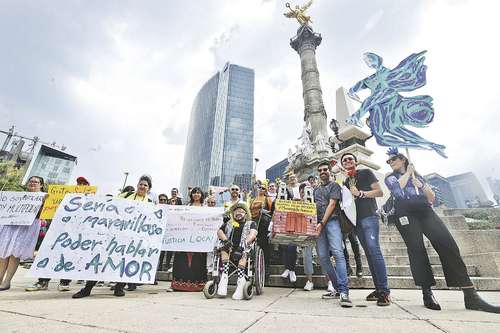Ilse Gutiérrez, a member of Orgullo Loco México, said in an interview that those taking psychotropic drugs can take about “twenty” pills a day. For ten years, she has been taking the powerful compound.
Lorena Berríos is a member of the board of directors of RedEsfera Latinoamericana and has been on medication for 12 years. At the time, he would sometimes “take a thousand pills a month.”
Both are now out of medical care, recovering “bit by bit” from their damaged health, and are both part of groups fighting for the rights of people with psychosocial disabilities. “We’re a voice for peers who are locked up, drugged, and infantilized,” Lorena told us. That day.
Activists stress that it’s not that “subjectively uncomfortable people don’t want them to support us, but that the other thing is being drugged, institutionalized; now being questioned by international standards”.
Members of Orgullo Loco México and Red Esfera marched yesterday to denounce “forced drug use”, discrimination and stigma, and to demand a cultural and structural shift in the understanding of madness and mental health.
The walk starts at Ángel de la Independencia and goes to Estela de Luz, where they hold up banners saying: “The limit is my madness”; “If I don’t know madness, I can’t be happy” and “Shout, jump , laugh, cry, but don’t stop” and so on.
Ilse Gutiérrez explained to this newspaper that they are against “involuntary drug treatment because most people are not asked if they really want to eat such a thing”.
He added, “We also object to drug treatments that do not have a clear target and do not explain to us their impact in the short, medium and long term.”
These, he emphasized, “can lead to hormonal and gastrointestinal disorders such as gastritis and neurocolitis, as well as elevated triglycerides, weight gain, greater susceptibility to diabetes, cardiovascular disease, all of which are not reported to us. “
Researcher Grecia Guzmán explained that psychiatric drugs “are often taken for a long time, and it is very difficult to reduce the dose even if people want to, which is a violation of rights.”
Lorena Barrios said, “When a person is in a moment of exacerbation, psychiatric drugs do help, but what has to be treated is the underlying problem, and these psychiatric drugs don’t address that. ,” she thought.

